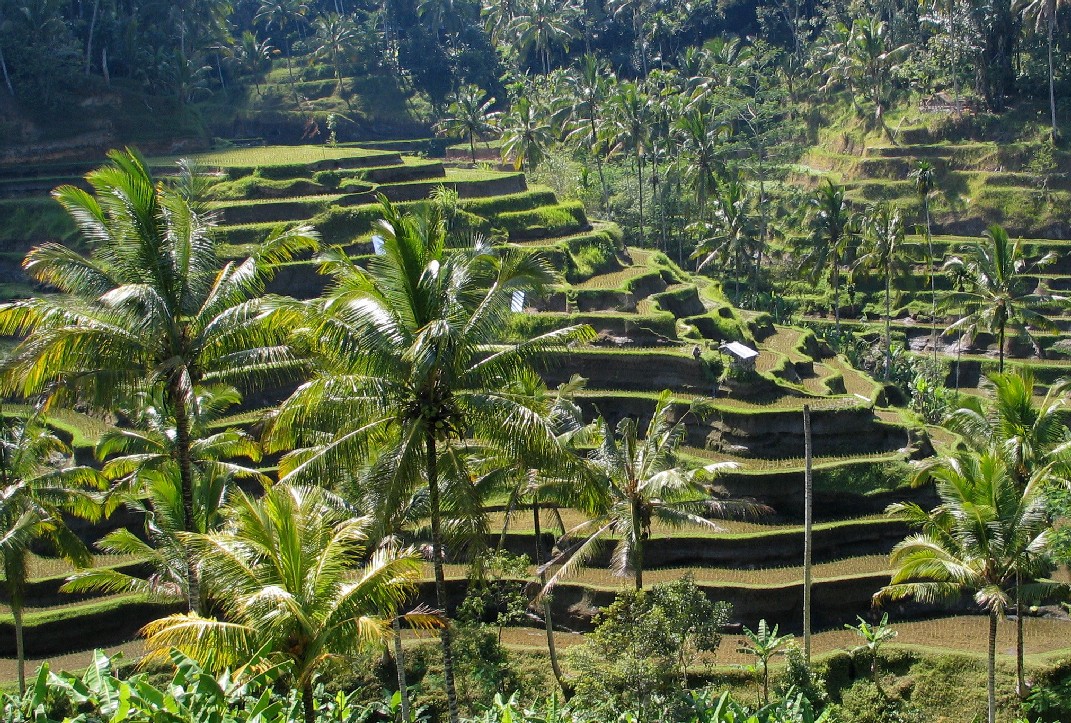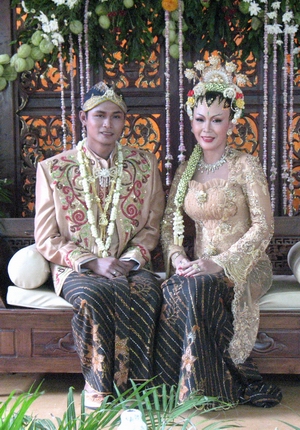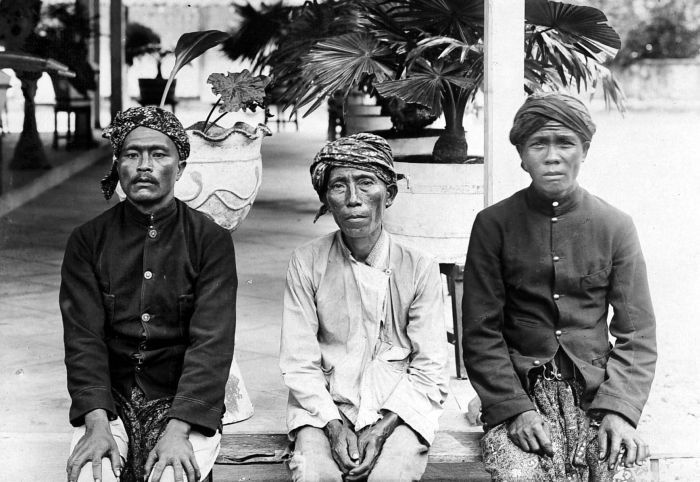|
Dutch Intervention In Northern Bali (1848)
The Dutch intervention in Northern Bali in 1848 was the second in a long series of six Dutch military interventions on Bali island, until total control was achieved with the Dutch intervention in Bali in 1908. The Dutch used as a pretext Balinese salvage claims over shipwrecks, which were customary to the Balinese, but unacceptable under International law. The expedition arrived in 2,400 men, a third of which was composed of Europeans, the rest being Javanese and Madurese soldiers, as well as one company of Africans, probably from the Dutch colony in Ghana.A short history of Bali: ''Indonesia's Hindu realm'' by Robert Pringle p.9/ref> The force landed in Bali on 7 May 1848 in the area of Sangsit. The Balinese numbered 16,000, including about 1,500 equipped with firearms under Jelantik. After the Dutch landing, the Balinese withdrew to their fortified position in Jagaraga about 4 kilometers away. The Dutch attacked the Balinese in Jagaraga despite the intense tropical heat ... [...More Info...] [...Related Items...] OR: [Wikipedia] [Google] [Baidu] |
Balinese Soldiers 1880s
Balinese may refer to: * Bali, an Indonesian island *Balinese art *Balinese dance * Balinese people * Balinese language **Balinese script **Balinese (Unicode block) *Balinese mythology *Balinese cat, a cat breed *Balinese Gamelan, local music *Balinese Room, a famous illegal casino in Galveston, Texas *"Balinese", a song by ZZ Top from their 1975 album, ''Fandango! ''Fandango!'' is the fourth album by the American rock band ZZ Top, released in 1975. The album's first side consists of selections from live shows, with the second side being new studio recordings. A remastered and expanded edition of this al ...'' {{disambiguation Language and nationality disambiguation pages ... [...More Info...] [...Related Items...] OR: [Wikipedia] [Google] [Baidu] |
Bali
Bali () is a province of Indonesia and the westernmost of the Lesser Sunda Islands. East of Java and west of Lombok, the province includes the island of Bali and a few smaller neighbouring islands, notably Nusa Penida, Nusa Lembongan, and Nusa Ceningan to the southeast. The provincial capital, Denpasar, is the most populous city in the Lesser Sunda Islands and the second-largest, after Makassar, in Eastern Indonesia. The upland town of Ubud in Greater Denpasar is considered Bali's cultural centre. The province is Indonesia's main tourist destination, with a significant rise in tourism since the 1980s. Tourism-related business makes up 80% of its economy. Bali is the only Hindu-majority province in Indonesia, with 86.9% of the population adhering to Balinese Hinduism. It is renowned for its highly developed arts, including traditional and modern dance, sculpture, painting, leather, metalworking, and music. The Indonesian International Film Festival is held every year in Bal ... [...More Info...] [...Related Items...] OR: [Wikipedia] [Google] [Baidu] |
Dutch Intervention In Bali (1908)
The Dutch intervention in Bali in 1908 marked the final phase of Dutch colonial control over the island of Bali in Indonesia. It was the seventh and last military intervention in Bali, following the Dutch intervention in Bali (1906). The intervention was triggered by a Balinese revolt against a Dutch attempt to impose an opium monopoly in their favour. The raja of Karangasem opposed the monopoly, leading to riots in the capital of Klungkung. Riots also erupted in Gelgel, when the Balinese killed a Javanese opium dealer.''Insight Guides Indonesia'', p.40 The Dutch sent troops to quell the riots. In Gelgel, they killed 100 Balinese, forcing the Raja to flee to Klungkung. The Dutch then bombarded the city of Klungkung. In a final confrontation on 18 April 1908, Dewa Agung Jambe, the Raja of Klungung, accompanied by 200 followers, made a desperate sortie out of his Palace, clad in white and armed with a legendary '' kris'' supposed to wreak havoc on the enemy according to a pr ... [...More Info...] [...Related Items...] OR: [Wikipedia] [Google] [Baidu] |
Shipwrecks
A shipwreck is the wreckage of a ship that is located either beached on land or sunken to the bottom of a body of water. Shipwrecking may be intentional or unintentional. Angela Croome reported in January 1999 that there were approximately three million shipwrecks worldwide (an estimate rapidly endorsed by UNESCO and other organizations). When a ship's crew has died or abandoned the ship, and the ship has remained adrift but unsunk, they are instead referred to as ghost ships. Types Historic wrecks are attractive to maritime archaeologists because they preserve historical information: for example, studying the wreck of revealed information about seafaring, warfare, and life in the 16th century. Military wrecks, caused by a skirmish at sea, are studied to find details about the historic event; they reveal much about the battle that occurred. Discoveries of treasure ships, often from the period of European colonisation, which sank in remote locations leaving few livin ... [...More Info...] [...Related Items...] OR: [Wikipedia] [Google] [Baidu] |
Javanese People
The Javanese ( id, Orang Jawa; jv, ꦮꦺꦴꦁꦗꦮ, ''Wong Jawa'' ; , ''Tiyang Jawi'' ) are an ethnic group native to the central and eastern part of the Indonesian island of Java. With approximately 100 million people, Javanese people are the largest ethnic group in Indonesia and the whole Southeast Asia in general. Their native language is Javanese, it is the largest of the Austronesian languages in number of native speakers and also the largest regional language in Southeast Asia. The Javanese as the largest ethnic group in the region have dominated the historical, social, and political landscape in the past as well as in modern Indonesia and Southeast Asia. There are significant numbers of Javanese diaspora outside of central and eastern Java regions, including the other provinces of Indonesia, and also in another countries such as Suriname, Singapore, Malaysia, Egypt, Saudi Arabia, South Africa, Sri Lanka, Yemen and the Netherlands. The Javanese ethnic group h ... [...More Info...] [...Related Items...] OR: [Wikipedia] [Google] [Baidu] |
Madurese People
id, Orang Madura , image = , image_caption = A portrait of Madurese village head. , population = 7,179,356 , popplace = : , region1 = East Java , pop1 = 6,520,403 , region2 = West Kalimantan , pop2 = 274,869 , region3 = Jakarta , pop3 = 79,925 , region4 = South Kalimantan , pop4 = 53,002 , region5 = East Kalimantan , pop5 = 46,823 , region6 = West Java , pop6 = 43,001 , region7 = Central Kalimantan , pop7 = 42,668 , region8 = Bali , pop8 = 29,864 , region9 = Bangka Belitung , pop9 = 15,429 , region10 = Central Java , pop10 = 12,920 , langs = Native MadureseAlsoIndonesian Javanese , rels = Islam , related = Javanese people, Sundanese people The Madurese (sometimes Madurace or Madhurâ; also known as Orang Madura and Suku Madura in Indonesian) are an ethnic group originally from the island o ... [...More Info...] [...Related Items...] OR: [Wikipedia] [Google] [Baidu] |
Ghana
Ghana (; tw, Gaana, ee, Gana), officially the Republic of Ghana, is a country in West Africa. It abuts the Gulf of Guinea and the Atlantic Ocean to the south, sharing borders with Ivory Coast in the west, Burkina Faso in the north, and Togo in the east.Jackson, John G. (2001) ''Introduction to African Civilizations'', Citadel Press, p. 201, . Ghana covers an area of , spanning diverse biomes that range from coastal savannas to tropical rainforests. With nearly 31 million inhabitants (according to 2021 census), Ghana is the List of African countries by population, second-most populous country in West Africa, after Nigeria. The capital and List of cities in Ghana, largest city is Accra; other major cities are Kumasi, Tamale, Ghana, Tamale, and Sekondi-Takoradi. The first permanent state in present-day Ghana was the Bono state of the 11th century. Numerous kingdoms and empires emerged over the centuries, of which the most powerful were the Kingdom of Dagbon in the north and ... [...More Info...] [...Related Items...] OR: [Wikipedia] [Google] [Baidu] |
Jelantik
I Gusti Ketut Jelantik (-1849) was a Balinese Prime Minister of the state of Buleleng, who resisted the imposition of Dutch treaties.''A short history of Bali: Indonesia's Hindu realm'' Robert Pringle p.96''ff'/ref> Military career He became a leader in the resistance against the Dutch invasion of Bali, fighting them in several Dutch military interventions: the Dutch intervention in Northern Bali during Dutch intervention in Northern Bali (1846), 1846, 1848, and 1849. In 1849, he escaped the Dutch offensive in Buleleng with the ruler of Buleleng, and fled to escape to allied Karangasem, but he was ultimately killed in an ambush by forces of Lombok Lombok is an island in West Nusa Tenggara province, Indonesia. It forms part of the chain of the Lesser Sunda Islands, with the Lombok Strait separating it from Bali to the west and the Alas Strait between it and Sumbawa to the east. It is rou ..., allies of the Dutch.''A short history of Bali: Indonesia's Hindu realm'' Robert P ... [...More Info...] [...Related Items...] OR: [Wikipedia] [Google] [Baidu] |
Dutch Intervention In Bali (1849)
The Dutch intervention in Bali in 1849 was a major Dutch military intervention in Northern and Southern Bali, following two failed interventions, the 1846 intervention and the 1848 intervention. The Dutch used as a pretext Balinese salvage claims over shipwrecks, which were customary to the Balinese, but unacceptable under International law. Dutch naval expedition The expedition arrived off Buleleng in 1849. It was a considerable force of the Royal Dutch East Indies Army, composed of 100 ships, 3,000 sailors, and 5,000 well-trained soldiers, including a majority of Dutch troops.''International Dictionary of Historic Places: Asia and Oceania'' by Trudy Ring p.6/ref>''A short history of Bali: Indonesia's Hindu realm'' Robert Pringle p.98''ff'/ref> The Dutch landed in Buleleng and marched on Singaraja, only to discover that the whole town had been abandoned. The Dutch occupied the town, but soon faced a dilemma by the arrival of a Balinese delegation. Dutch General Andreas Victo ... [...More Info...] [...Related Items...] OR: [Wikipedia] [Google] [Baidu] |





